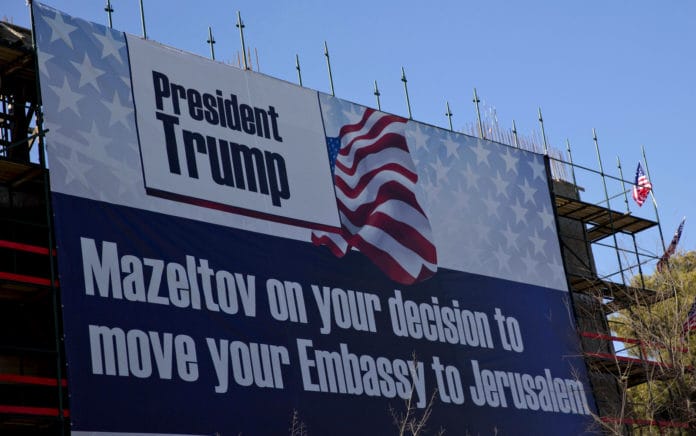

Senior White House officials said in a briefing to reporters on Tuesday night that President Trump will announce plans Wednesday to recognize Jerusalem as the capital of Israel and also direct the State Department to begin moving the U.S. Embassy in Israel from Tel Aviv to Jerusalem, in honor of Israel’s 70th Independence Day.
“The president will say that the United States recognizes Jerusalem as the capital of Israel – it is recognition of the historical reality that Jerusalem has been the center of Jewish faith for thousands of years, and the reality today in which the government ministries, the Supreme Court and the central authorities are all located in the capital of Israel – Jerusalem,” the White House officials said.
“The second statement [in Trump’s speech] will be that the president ordered the State Department to begin the process of moving the embassy from its present location in Tel Aviv to a new location in Jerusalem,” the officials continued.


They say no official boundaries within Jerusalem will change and that will be left up to both the Israelis and the Palestinians.
Instead, the White House officials say this move is based on the “recognition of reality,” affirming the fact that Jerusalem has been Israel’s seat of power for the last seven decades. Trump’s announcement fulfills his major campaign promise of saying he would move the U.S. Embassy in Israel to Jerusalem.


According to three White House officials, here is what President Trump is expected to announce tomorrow
1. Recognition of Jerusalem as the capital of Israel.
2. The beginning of the process for the relocation of the US Embassy to Jerusalem.
3. Site of new embassy hasn’t been finalized.
4. It’ll be a slow, ground up process. Dedicating a single room as the embassy isn’t being considered.
5. Status quo for Temple Mount will be upheld.
6. Trump won’t recognize East Jerusalem as occupied territory.
The Trump administration says they’re very much committed to the Mideast peace process and believe there has been progress made behind the scenes. However, the Senior White House staffers believe the United States position of, “ambiguity” on issues relating to Jerusalem and the embassy haven’t helped advance the prospects of peace the last few decades.
White House administration officials believe that approach hasn’t worked and taking it off the negotiation table will help both sides come to an agreement on bigger issues that keep them apart.
The Administration reportedly hasn’t decided where the U.S. embassy will be built in Jerusalem, acknowledging it could take years to eventually complete the move.
The State Department will be tasked with coming up with a plan to find a site and build it. Until then, the president will continue to sign waivers required under U.S. law to keep the embassy in Tel Aviv until the project is completed.
When asked what would happen if President Trump wasn’t in office before the embassy was built, administration officials pointed out that once construction on an embassy begins, it doesn’t usually get stopped.
CBN & JBN contributed to this story.










